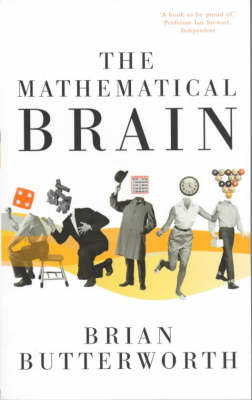
The Mathematical Brain
Seiten
2000
Papermac (Verlag)
978-0-333-76610-1 (ISBN)
Papermac (Verlag)
978-0-333-76610-1 (ISBN)
- Titel ist leider vergriffen;
keine Neuauflage - Artikel merken
First published in 1999, this book revolutionizes our understanding of the extraordinary world of numbers. Why are some people so good, and others so bad, at numbers? Butterworth argues that our genes contain instructions for building a mathematical brain and this is why, without benefit of teaching, humans are born to count.
The concept of numbers and the ability to recognize and process them is innate, part of everyone's intellectual apparatus whether they've had formal education or not. This "number instinct" is not dependent on basic intelligence or general knowledge, a fact which has implications for neuroscience and poses the question: why did man evolve with such specialized neural apparatus. It has been that the social development of humans has been crucially affected by language, yet numbers have also been critical in the advancement of human culture. Every child goes through a stage of learning to count using their ten fingers, much as early Homo Sapiens must have done. If number learning is a natural and universal function of the brain, why do so many suffer from dyscalculia? This text, containing theories and anecdote, is an investigation into the bizarre world of numbers. It examines the role of education, good or bad, in the development of mathematical disorders.
The concept of numbers and the ability to recognize and process them is innate, part of everyone's intellectual apparatus whether they've had formal education or not. This "number instinct" is not dependent on basic intelligence or general knowledge, a fact which has implications for neuroscience and poses the question: why did man evolve with such specialized neural apparatus. It has been that the social development of humans has been crucially affected by language, yet numbers have also been critical in the advancement of human culture. Every child goes through a stage of learning to count using their ten fingers, much as early Homo Sapiens must have done. If number learning is a natural and universal function of the brain, why do so many suffer from dyscalculia? This text, containing theories and anecdote, is an investigation into the bizarre world of numbers. It examines the role of education, good or bad, in the development of mathematical disorders.
| Erscheint lt. Verlag | 24.3.2000 |
|---|---|
| Verlagsort | London |
| Sprache | englisch |
| Maße | 135 x 216 mm |
| Gewicht | 525 g |
| Themenwelt | Geisteswissenschaften ► Psychologie ► Allgemeine Psychologie |
| Geisteswissenschaften ► Psychologie ► Pädagogische Psychologie | |
| Mathematik / Informatik ► Mathematik ► Allgemeines / Lexika | |
| Mathematik / Informatik ► Mathematik ► Mathematische Spiele und Unterhaltung | |
| ISBN-10 | 0-333-76610-5 / 0333766105 |
| ISBN-13 | 978-0-333-76610-1 / 9780333766101 |
| Zustand | Neuware |
| Haben Sie eine Frage zum Produkt? |
Mehr entdecken
aus dem Bereich
aus dem Bereich
wie Affekte innere Entwicklung ermöglichen
Buch | Softcover (2023)
Klett-Cotta (Verlag)
CHF 41,95
Buch | Softcover (2024)
Hogrefe Verlag
CHF 46,50


